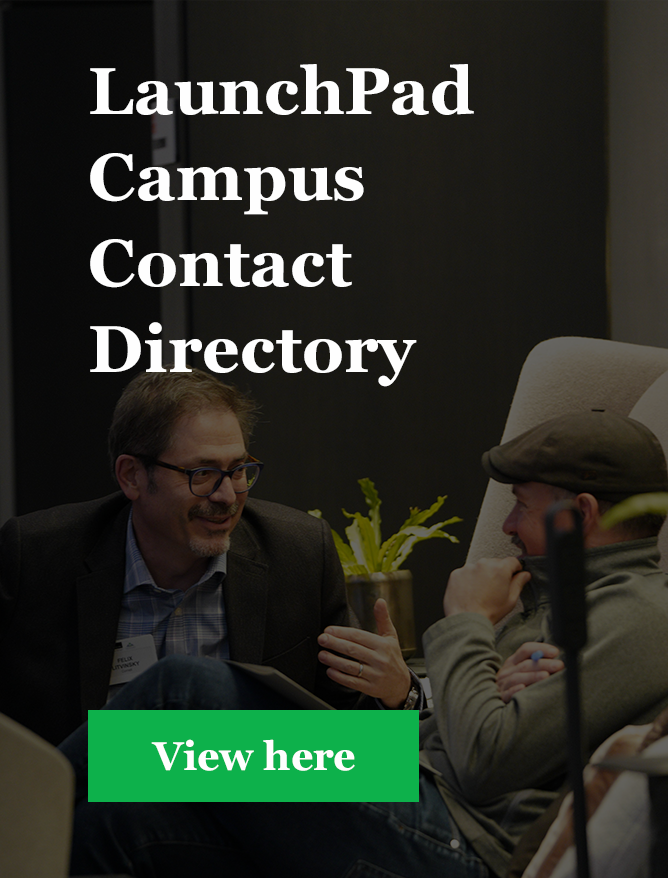The January 2020 biennial LaunchPad reporting and April network collaboration call revealed a number of challenges related to LaunchPad member sustainability. In particular:
- It takes longer than expected (more than 1.5 years, on average) for LaunchPad network programs to raise any external funding.
- Even after being in the network for many years, LaunchPad network programs are raising less external funding than one would expect.
- Time/capacity of campus directors is the biggest impediment to LaunchPad network programs raising more external funding.
To address these trends, and collaboratively identify some strategies and best practices, we sought insights from Victoria Slivkoff, University of California - Office of the President and Don Lewis & Sophia Bishop, Texas A&M University. The following are six ideas that arose from this conversation.
.png?width=386&name=Best%20Practice%20Sustainability%20(email).png)
1. Begin the donor cultivation process early and formalize your connection to university fundraising staff.
Landing a major gift often takes 2 years or more of donor cultivation (“moves” meetings, providing update communication, inviting to events, and soliciting lesser gifts). If a university entrepreneurship center is not spending a small - but regular - amount of time on fundraising and sustainability strategies before joining the LaunchPad network, it should begin to do so immediately. 
Useful steps in this initial process include: Introducing yourself and the LaunchPad to college or university development staff (highlighting which schools participants are coming from), researching funder sources of local entrepreneurial entities and initiatives, reviewing past and future alumni donor lists, and setting up a regular cadence of meetings with development staff. (The most common frequency of these meetings with LaunchPad Campus Directors is quarterly or monthly.)
Another strategy is to invite executive-level fundraising staff to join your entrepreneurship stewardship council.  This can save you time by limiting the number of one-off university staff meetings and provide an opportunity to inform, update, build relationships with development, marketing, and academic staff all at once. Recognize that fundraising staff will be most successful when they are aware of donor engagement opportunities well in advance. Strengthening the fundraising relationships in this way can also help prevent the risk of LaunchPad being “used” by school fundraisers - without reaping the benefits of those gifts directly.
This can save you time by limiting the number of one-off university staff meetings and provide an opportunity to inform, update, build relationships with development, marketing, and academic staff all at once. Recognize that fundraising staff will be most successful when they are aware of donor engagement opportunities well in advance. Strengthening the fundraising relationships in this way can also help prevent the risk of LaunchPad being “used” by school fundraisers - without reaping the benefits of those gifts directly.
2. Be thoughtful about your LaunchPad’s unique value proposition and consider how to leverage your organizational location.
As shared during the Marketing and PR AMA in earlier April, it isn’t just student startups that should have an elevator pitch. Victoria from the University of California also encouraged Campus Directors to consider what is unique about their LaunchPad. Is it some special focus on diversity and inclusion programming? Do you support an unusual or specific student population? Consider the trends of past participants - their academic programs, startup industries, career outcomes, even where your LaunchPad is organizationally located within the university structure can be informative in developing your unique value proposition.
LaunchPads that are embedded in business schools may benefit from access to wealthier (traditionally corporate) alumni donors, more dedicated and experienced business development staff, and greater synergies with other programs. However, operating from an office of research, general undergraduate or graduate studies school, or university library, some LaunchPads benefit from being able to work with development staff and donors of all colleges. Be sure to “share the success” of your LaunchPad students with their college’s fundraising staff (and their college’s academic leadership and marketing staff.)
3. Diversify your external funding channels.

Fewer than ¼ of LaunchPad programs indicated that their funding comes in part from other foundation grants, local businesses, government grants, national/international businesses, or parents. These are all major untapped revenue channels and are all worthy of being explored.
For each of these populations, the access to student entrepreneurs that you offer carries some value. Local businesses may be interested in promoting their products and services. Major national and international businesses are often interested in recruiting and looking for new channels to access talented and highly motivated young people. Foundations and individual donors may simply be interested in brand awareness that comes with a program naming opportunity. Government entities are anxious to show real results in their designated geography for their investments, so being able to report on the outcomes of your program regionally is likely critical to gaining their support.
Also, recognize that different divisions within the university - including admissions and alumni relations for parents, corporate and foundation relations for businesses and foundations, and offices of sponsorship research for government grants - may manage different funding relationships.
In addition to the high-level strategies and recommendations discussed above, a number of comments and questions arose during our discussions that provided some quicker, tactical advice:
- It is all about relationships and rapport. You won’t be successful in raising money for your LaunchPad if the only communication to donors is the ask. Invite them to get involved (be a speaker, judge a competition, mentor a student…) well in advance of ever soliciting their financial support. More engaged individuals and organizations are more generous.
- Be comprehensive and specific in the support you seek. When “making the ask” be sure to include appropriate line items for staff funding, administrative expenses, operational and program overhead, etc. These costs may account for 30-35% of a budget and without it, your LaunchPad is unable to operate. Beyond student scholarships and other easier-to-fund areas, be realistic about your costs and needs.
- Share your success stories directly with development staff and donors. Nothing succeeds like success, and donors of all variety (and the fundraising staff that can connect you to them) want to see your results. Share your students’ career successes, startup successes, even corporate and foundation partnership successes. Finally, always remember to incorporate donor recognition into your LaunchPad stories when and where possible.
See recording below for the entire network call conversation:






